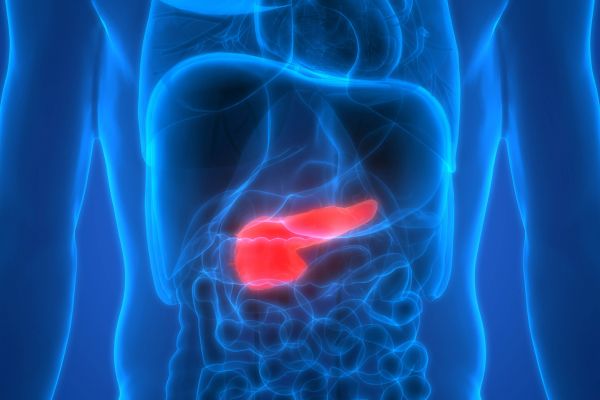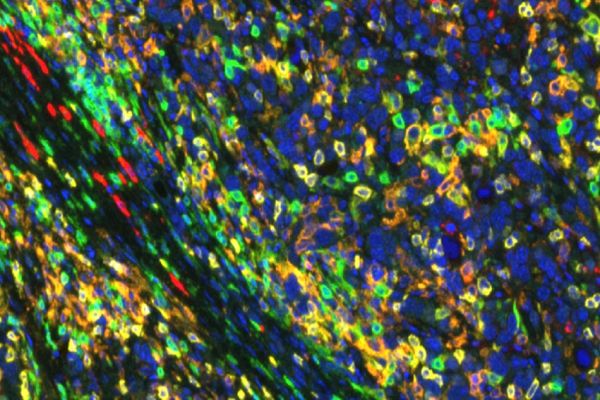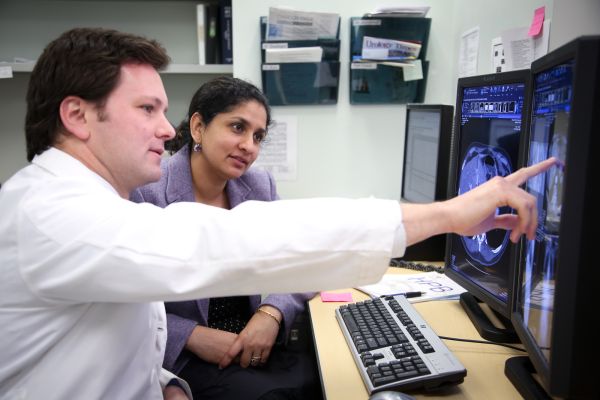Pancreatic cancer is known for its aggressive behavior, late-stage diagnosis, limited treatment options, and low survival rates. Understanding and advancing our knowledge about this disease through research is crucial to impacting outcomes.
The Pancreatic Cancer Research Center forms a coalition across scientific disciplines to accelerate research in this high-need area and strategize efforts leveraging scientific collaboration, developing novel clinical trials, and streamlining data sharing.
Research focus
Our multidisciplinary approach aims to tackle the challenges of pancreatic cancer such as identifying risk factors, developing early detection methods, improving quality of life and establishing clinical trials. Our work focuses on these critical areas:
Identifying risk factors and biomarkers for early detection
Pancreatic cancer is usually diagnosed at an advanced stage, which significantly reduces the effectiveness of available treatments. Research efforts focus on identifying reliable biomarkers and developing screening methods that can detect the disease in its early stages when treatment outcomes are much more favorable. Identifying and understanding risk factors for pancreatic cancer can aid in prevention and early intervention strategies. Research can help clarify how factors such as genetics, lifestyle choices, and environmental exposures contribute to the development of the disease.
Workgroups include: Biomarkers, Genetics
Applying immunotherapy to pancreatic cancer
Immunotherapy has shown promising results in treating various types of cancer. Research is ongoing to determine how immunotherapy can be applied effectively to pancreatic cancer, potentially harnessing the body's immune system to recognize and attack cancer cells. Furthermore, the patient’s own cells can be selectively engineered to kill the pancreatic cancer cells using innovative approaches developed at Roswell Park.
Workgroups include: CAR-T and cellular therapies, Tumor microenvironment. Investigating determinants of resistance to KRAS inhibitors and the impact on tumorigenic proliferation as well as the tumor microenvironment. We have collaborative manuscripts and grants in progress.
Understanding tumor biology for developing novel interventions
In-depth research into the biology of pancreatic cancer can provide insights into the genetic and molecular mechanisms driving its growth and spread. This knowledge can lead to the development of targeted therapies that disrupt specific pathways essential for tumor growth, minimizing damage to healthy tissue. Such analyses can be furthered by combining investigating combinations of treatments, such as chemotherapy, targeted therapy, and immunotherapy, to enhance the overall efficacy of treatment. These rational combinations may improve response rates and prolong survival for patients with advanced disease.
Workgroups include: RAS and targeted therapy, Epigenetic modulation
Engage our community
There is a major opportunity to utilize the combined strengths at Roswell Park in pancreatic cancer to address the needs of our community. Such efforts include bi-directional communication, education, and advocacy.
Aggregating information from research and the clinic
Collaborative research efforts contribute to the accumulation of data and information about pancreatic cancer cases. This information can be used to identify trends, patterns, and treatment outcomes, leading to more informed clinical decisions. The Pancreatic Cancer Research Center provides a unique opportunity to utilize information across disciplines to advance new opportunities.
Clinical research
Research drives the development of clinical trials, which are essential for testing new therapies and treatment approaches. Participation in clinical trials gives patients access to cutting-edge treatments that could potentially improve their outcomes. Pancreatic cancer and its treatments often have a significant impact on patients' quality of life due to symptoms and side effects. Research efforts can lead to the development of supportive care strategies that alleviate symptoms and improve the overall well-being of patients undergoing treatment.
Recent publications
- Kumarasamy V, et al. The extracellular niche and tumor microenvironment enhance KRAS inhibitor efficacy in pancreatic cancer. Cancer Res. 2024 Jan 31. doi: 10.1158/0008-5472.CAN-23-2504.
- Wang W, Ling X, Wang R, Xiong H, Hu L, Yang Z, Wang H, Zhang Y, Wu W, Singh PK, Wang J, Li F, Li Q. Structure-Activity Relationship of FL118 Platform Position 7 Versus Position 9-Derived Compounds and Their Mechanism of Action and Antitumor Activity. J Med Chem. 2023 Dec 28;66(24):16888-16916. doi: 10.1021/acs.jmedchem.3c01589. Epub 2023 Dec 15. PMID: 38100041.
- Cornwell AC, Tisdale AA, Venkat S, Maraszek KE, Alahmari AA, George A, Attwood K, George M, Rempinski D, Franco-Barraza J, Seshadri M, Parker MD, Cortes Gomez E, Fountzilas C, Cukierman E, Steele NG, Feigin ME. Lorazepam Stimulates IL6 Production and Is Associated with Poor Survival Outcomes in Pancreatic Cancer. Clin Cancer Res. 2023 Sep 15;29(18):3793-3812. Doi: 10.1158/1078-0432.CCR-23-0547. PMID: 37587561; PMCID: PMC10502465.
- Friedlander M, Mileshkin L, Lombard J, Frentzas S, Gao B, Wilson M, Meniawy T, Baron-Hay S, Briscoe K, McCarthy N, Fountzilas C, Cervantes A, Ge R, Wu J, Spira A. Pamiparib in combination with tislelizumab in patients with advanced solid tumours: results from the dose-expansion stage of a multicentre, open-label, phase I trial. Br J Cancer. 2023 Sep;129(5):797-810. Doi: 10.1038/s41416-023-02349-0. Epub 2023 Jul 20. PMID: 37474720; PMCID: PMC10449784.
- Li F, Ling X, Chakraborty S, Fountzilas C, Wang J, Jamroze A, Liu X, Kalinski P, Tang DG. Role of the DEAD-box RNA helicase DDX5 (p68) in cancer DNA repair, immune suppression, cancer metabolic control, virus infection promotion, and human microbiome (microbiota) negative influence. J Exp Clin Cancer Res. 2023 Aug 19;42(1):213. Doi: 10.1186/s13046-023-02787-x. PMID: 37596619; PMCID: PMC10439624.
- Chiorean EG, Chiaro MD, Tempero MA, Malafa MP, Benson AB, Cardin DB, Christensen JA, Chung V, Czito B, Dillhoff M, Donahue TR, Dotan E, Fountzilas C, Glazer ES, Hardacre J, Hawkins WG, Klute K, Ko AH, Kunstman JW, LoConte N, Lowy AM, Masood A, Moravek C, Nakakura EK, Narang AK, Nardo L, Obando J, Polanco PM, Reddy S, Reyngold M, Scaife C, Shen J, Truty MJ, Vollmer C, Wolff RA, Wolpin BM, Rn BM, Lubin S, Darlow SD. Ampullary Adenocarcinoma, Version 1.2023, NCCN Clinical Practice Guidelines in Oncology. J Natl Compr Canc Netw. 2023 Jul;21(7):753-782. doi: 10.6004/jnccn.2023.0034. PMID: 37433437.
- Kumarasamy V, Frangou C, Wang J, Wan Y, Dynka A, Rosenheck H, Dey P, Abel EV, Knudsen ES, Witkiewicz AK. Pharmacologically targeting KRAS (G12D) in PDAC models: tumor cell intrinsic and extrinsic impact. bioRxiv. 2023 Apr 20;. doi: 10.1101/2023.03.18.533261. PubMed PMID: 37162905; PubMed Central PMCID: PMC10168422.
- Nimgaonkar V, Krishna V, Krishna V, Tiu E, Joshi A, Vrabac D, Bhambhvani H, Smith K, Johansen JS, Makawita S, Musher B, Mehta A, Hendifar A, Wainberg Z, Sohal D, Fountzilas C, Singhi A, Rajpurkar P, Collisson EA. Development of an artificial intelligence-derived histologic signature associated with adjuvant gemcitabine treatment outcomes in pancreatic cancer. Cell Rep Med. 2023 Apr 18;4(4):101013. Doi: 10.1016/j.xcrm.2023.101013. Epub 2023 Apr 11. PMID: 37044094; PMCID: PMC10140610.
- Davis EW, McCann SE, Joseph JM, Yeary KHK, Fountzilas C, Moysich KB. Sugar Sweetened and Artificially Sweetened Beverage Consumption and Pancreatic Cancer: A Retrospective Study. Nutrients. 2023 Jan 5;15(2):275. Doi: 10.3390/nu15020275. PMID: 36678146; PMCID: PMC9866356.
- Gulhati P, Schalck A, Jiang S, Shang X, Wu CJ, Hou P, Ruiz SH, Soto LS, Parra E, Ying H, Han J, Dey P, Li J, Deng P, Sei E, Maeda DY, Zebala JA, Spring DJ, Kim M, Wang H, Maitra A, Moore D, Clise-Dwyer K, Wang YA, Navin NE, DePinho RA. Targeting T cell checkpoints 41BB and LAG3 and myeloid cell CXCR1/CXCR2 results in antitumor immunity and durable response in pancreatic cancer. Nat Cancer. 2023 Jan;4(1):62-80. doi: 10.1038/s43018-022-00500-z. Epub 2022 Dec 30. PubMed PMID: 36585453; PubMed Central PMCID: PMC9925045.
- Zhu Z, McGray AJR, Jiang W, Lu B, Kalinski P, Guo ZS. Improving cancer immunotherapy by rationally combining oncolytic virus with modulators targeting key signaling pathways. Mol Cancer. 2022 Oct 12;21(1):196. Doi: 10.1186/s12943-022-01664-z. PMID: 36221123; PMCID: PMC9554963.
- Alam A, Comer S, Levanduski E, Dey P. Isolation and adoptive transfer of innate lymphoid cells 2 to a recipient mouse model of PDAC. STAR Protoc. 2022 Sep 16;3(3):101563. Doi: 10.1016/j.xpro.2022.101563. eCollection 2022 Sep 16. PubMed PMID: 35874471; PubMed Central PMCID: PMC9304675.
- Boland PM, Fountzilas C, Fakih M, Opyrchal M, Diamond JR, Corr B, Ma WW, Redman M, Chan WK, Wang H, Kramer D, Kwan R, Cutler D, Zhi J, Jimeno A. A dose regimen-finding study to evaluate the safety, tolerability, pharmacokinetics, and activity of oratecan in subjects with advanced malignancies. Cancer Chemother Pharmacol. 2022 Aug;90(2):175-187. Doi: 10.1007/s00280-022-04453-z. Epub 2022 Jul 29. PMID: 35904620.
- Chen P, Dey P. Co-dependencies in the tumor immune microenvironment. Oncogene. 2022 Jul;41(31):3821-3829. doi: 10.1038/s41388-022-02406-7. Epub 2022 Jul 11. Review. PubMed PMID: 35817840; PubMed Central PMCID: PMC9893036.
- Li F, Aljahdali IAM, Ling X. Molecular Glues: Capable Protein-Binding Small Molecules That Can Change Protein-Protein Interactions and Interactomes for the Potential Treatment of Human Cancer and Neurodegenerative Diseases. Int J Mol Sci. 2022 Jun 1;23(11):6206. doi: 10.3390/ijms23116206. PMID: 35682885; PMCID: PMC9181451.
- Ling X, Wu W, Aljahdali IAM, Liao J, Santha S, Fountzilas C, Boland PM, Li F. FL118, acting as a ‘molecular glue degrader’, binds to dephosphorylates and degrades the oncoprotein DDX5 (p68) to control c-Myc, urviving and mutant Kras against colorectal and pancreatic cancer with high efficacy. Clin Transl Med. 2022 May;12(5):e881. Doi: 10.1002/ctm2.881. PMID: 35604033; PMCID: PMC9126027.
- Knudsen ES, Kumarasamy V, Nambiar R, Pearson JD, Vail P, Rosenheck H, Wang J, Eng K, Bremner R, Schramek D, Rubin SM, Welm AL, Witkiewicz AK. CDK/cyclin dependencies define extreme cancer cell-cycle heterogeneity and collateral vulnerabilities. Cell Rep. 2022 Mar 1;38(9):110448. doi: 10.1016/j.celrep.2022.110448. PMID: 35235778; PMCID: PMC9022184.
- Alam A, Levanduski E, Denz P, Villavicencio HS, Bhatta M, Alhorebi L, Zhang Y, Gomez EC, Morreale B, Senchanthisai S, Li J, Turowski SG, Sexton S, Sait SJ, Singh PK, Wang J, Maitra A, Kalinski P, DePinho RA, Wang H, Liao W, Abrams SI, Segal BH, Dey P. Fungal mycobiome drives IL-33 secretion and type 2 immunity in pancreatic cancer. Cancer Cell. 2022 Feb 14;40(2):153-167.e11. doi: 10.1016/j.ccell.2022.01.003. Epub 2022 Feb 3. PubMed PMID: 35120601; PubMed Central PMCID: PMC8847236.
- Basu A, Albert GK, Awshah S, Datta J, Kodumudi KN, Gallen C, Beyer A, Smalley KSM, Rodriguez PC, Duckett DR, Forsyth PA, Soyano A, Koski GK, Lima Barros Costa R, Han H, Soliman H, Lee MC, Kalinski P, Czerniecki BJ. Identification of Immunogenic MHC Class II Human HER3 Peptides that Mediate Anti-HER3 CD4+ Th1 Responses and Potential Use as a Cancer Vaccine. Cancer Immunol Res. 2022 Jan;10(1):108-125. doi: 10.1158/2326-6066.CIR-21-0454. Epub 2021 Nov 16. PMID: 34785506; PMCID: PMC9414303.
- Fountzilas C, Adjei A, Opyrchal M, Evans R, Ghasemi M, Attwood K, Groman A, Bshara W, Goey A, Wilton J, Ma WW, Iyer R. A phase I study of the anaplastic lymphoma kinase inhibitor ceritinib in combination with gemcitabine-based chemotherapy in patients with advanced solid tumors. Int J Cancer. 2021 Dec 15;149(12):2063-2074. Doi: 10.1002/ijc.33754. Epub 2021 Aug 27. PMID: 34319586; PMCID: PMC9005060.
- Li F, Fountzilas C, Puzanov I, Attwood KM, Morrison C, Ling X. Multiple functions of the DEAD-box RNA helicase, DDX5 (p68), make DDX5 a superior oncogenic biomarker and target for targeted cancer therapy. Am J Cancer Res. 2021 Oct 15;11(10):5190-5213. PMID: 34765320; PMCID: PMC8569338.
- Del Poggetto E, Ho IL, Balestrieri C, Yen EY, Zhang S, Citron F, Shah R, Corti D, Diaferia GR, Li CY, Loponte S, Carbone F, Hayakawa Y, Valenti G, Jiang S, Sapio L, Jiang H, Dey P, Gao S, Deem AK, Rose-John S, Yao W, Ying H, Rhim AD, Genovese G, Heffernan TP, Maitra A, Wang TC, Wang L, Draetta GF, Carugo A, Natoli G, Viale A. Epithelial memory of inflammation limits tissue damage while promoting pancreatic tumorigenesis. Science. 2021 Sep 17;373(6561):eabj0486. Doi: 10.1126/science.abj0486. Epub 2021 Sep 17. PubMed PMID: 34529467; PubMed Central PMCID: PMC9733946.
- Pearson JD, Huang K, Pacal M, McCurdy SR, Lu S, Aubry A, Yu T, Wadosky KM, Zhang L, Wang T, Gregorieff A, Ahmad M, Dimaras H, Langille E, Cole SPC, Monnier PP, Lok BH, Tsao MS, Akeno N, Schramek D, Wikenheiser-Brokamp KA, Knudsen ES, Witkiewicz AK, Wrana JL, Goodrich DW, Bremner R. Binary pan-cancer classes with distinct vulnerabilities defined by pro- or anti-cancer YAP/TEAD activity. Cancer Cell. 2021 Aug 9;39(8):1115-1134.e12. doi: 10.1016/j.ccell.2021.06.016. Epub 2021 Jul 21. PMID: 34270926; PMCID: PMC8981970.
- Venkat S, Alahmari AA, Feigin ME. Drivers of Gene Expression Dysregulation in Pancreatic Cancer. Trends Cancer. 2021 Jul;7(7):594-605. doi: 10.1016/j.trecan.2021.01.008. Epub 2021 Feb 19. Review. PubMed PMID: 33618999; PubMed Central PMCID: PMC8217125.
- Morrison MEW, Hobika EG, Joseph JM, Stenzel AE, Mongiovi JM, Tang L, McCann SE, Marshall J, Fountzilas C, Moysich KB. Cruciferous vegetable consumption and pancreatic cancer: A case-control study. Cancer Epidemiol. 2021 Jun;72:101924. Doi: 10.1016/j.canep.2021.101924. Epub 2021 Mar 11. PMID: 33714902; PMCID: PMC8278290.
- Dey P, Kimmelman AC, DePinho RA. Metabolic Codependencies in the Tumor Microenvironment. Cancer Discov. 2021 May;11(5):1067-1081. doi: 10.1158/2159-8290.CD-20-1211. Epub 2021 Jan 27. Review. PubMed PMID: 33504580; PubMed Central PMCID: PMC8102306.
- Tempero MA, Malafa MP, Al-Hawary M, Behrman SW, Benson AB, Cardin DB, Chiorean EG, Chung V, Czito B, Del Chiaro M, Dillhoff M, Donahue TR, Dotan E, Ferrone CR, Fountzilas C, Hardacre J, Hawkins WG, Klute K, Ko AH, Kunstman JW, LoConte N, Lowy AM, Moravek C, Nakakura EK, Narang AK, Obando J, Polanco PM, Reddy S, Reyngold M, Scaife C, Shen J, Vollmer C, Wolff RA, Wolpin BM, Lynn B, George GV. Pancreatic Adenocarcinoma, Version 2.2021, NCCN Clinical Practice Guidelines in Oncology. J Natl Compr Canc Netw. 2021 Apr 1;19(4):439-457. doi: 10.6004/jnccn.2021.0017. PMID: 33845462.
- Kumarasamy V, Vail P, Nambiar R, Witkiewicz AK, Knudsen ES. Functional Determinants of Cell Cycle Plasticity and Sensitivity to CDK4/6 Inhibition. Cancer Res. 2021 Mar 1;81(5):1347-1360. Doi: 10.1158/0008-5472.CAN-20-2275. Epub 2020 Dec 15. PMID: 33323381; PMCID: PMC8026500.
- Gupta M, Sherrow C, Krone ME, Blais EM, Pishvaian MJ, Petricoin EF, Matrisian LM, DeArbeloa P, Gregory G, Brown A, Zalewski O, Prinzing G, Roche C, Kanehira K, Mukherjee S, Iyer R, Fountzilas C. Targeting the NTRK Fusion Gene in Pancreatic Acinar Cell Carcinoma: A Case Report and Review of the Literature. J Natl Compr Canc Netw. 2021 Jan 6;19(1):10-15. Doi: 10.6004/jnccn.2020.7641. PMID: 33406492; PMCID: PMC8765083.
- Knudsen ES, Kumarasamy V, Chung S, Ruiz A, Vail P, Tzetzo S, Wu J, Nambiar R, Sivinski J, Chauhan SS, Seshadri M, Abrams SI, Wang J, Witkiewicz AK. Targeting dual signalling pathways in concert with immune checkpoints for the treatment of pancreatic cancer. Gut. 2021 Jan;70(1):127-138. Doi: 10.1136/gutjnl-2020-321000. Epub 2020 May 18. PMID: 32424005; PMCID: PMC7671951.
- Pratapwar M, Stenzel AE, Joseph JM, Fountzilas C, Etter JL, Mongiovi JM, Cannioto R, Moysich KB. Physical Inactivity and Pancreatic Cancer Mortality. J Gastrointest Cancer. 2020 Sep;51(3):1088-1093. Doi: 10.1007/s12029-020-00441-9. PMID: 32524304; PMCID: PMC8221412.
- Roberts PJ, Kumarasamy V, Witkiewicz AK, Knudsen ES. Chemotherapy and CDK4/6 Inhibitors: Unexpected Bedfellows. Mol Cancer Ther. 2020 Aug;19(8):1575-1588. Doi: 10.1158/1535-7163.MCT-18-1161. Epub 2020 Jun 16. PMID: 32546660; PMCID: PMC7473501.
- Franco J, Balaji U, Freinkman E, Witkiewicz AK, Knudsen ES. Metabolic Reprogramming of Pancreatic Cancer Mediated by CDK4/6 Inhibition Elicits Unique Vulnerabilities. Cell Rep. 2020 Jul 7;32(1):107793. doi: 10.1016/j.celrep.2020.107793. Erratum for: Cell Rep. 2016 Feb 9;14(5):979-990. PMID: 32640213; PMCID: PMC9540600.
- Weinberg BA, Wang H, Witkiewicz AK, Marshall JL, He AR, Vail P, Knudsen ES, Pishvaian MJ. A Phase I Study of Ribociclib Plus Everolimus in Patients with Metastatic Pancreatic Adenocarcinoma Refractory to Chemotherapy. J Pancreat Cancer. 2020 Jun 22;6(1):45-54. Doi: 10.1089/pancan.2020.0005. PMID: 32642630; PMCID: PMC7337242.
- Knudsen ES, Nambiar R, Rosario SR, Smiraglia DJ, Goodrich DW, Witkiewicz AK. Pan-cancer molecular analysis of the RB tumor suppressor pathway. Commun Biol. 2020 Apr 2;3(1):158. Doi: 10.1038/s42003-020-0873-9. PMID: 32242058; PMCID: PMC7118159.
- Venkat S, Tisdale AA, Schwarz JR, Alahmari AA, Maurer HC, Olive KP, Eng KH, Feigin ME. Alternative polyadenylation drives oncogenic gene expression in pancreatic ductal adenocarcinoma. Genome Res. 2020 Mar;30(3):347-360. Doi: 10.1101/gr.257550.119. Epub 2020 Feb 6. PubMed PMID: 32029502; PubMed Central PMCID: PMC7111527.
- Kumarasamy V, Ruiz A, Nambiar R, Witkiewicz AK, Knudsen ES. Chemotherapy impacts on the cellular response to CDK4/6 inhibition: distinct mechanisms of interaction and efficacy in models of pancreatic cancer. Oncogene. 2020 Feb;39(9):1831-1845. Doi: 10.1038/s41388-019-1102-1. Epub 2019 Nov 19. PMID: 31745297; PMCID: PMC7047578.
- Mahalingam D, Wilkinson GA, Eng KH, Fields P, Raber P, Moseley JL, Cheetham K, Coffey M, Nuovo G, Kalinski P, Zhang B, Arora SP, Fountzilas C. Pembrolizumab in Combination with the Oncolytic Virus Pelareorep and Chemotherapy in Patients with Advanced Pancreatic Adenocarcinoma: A Phase Ib Study. Clin Cancer Res. 2020 Jan 1;26(1):71-81. Doi: 10.1158/1078-0432.CCR-19-2078. Epub 2019 Nov 6. PMID: 31694832; PMCID: PMC6942612.
Upcoming events
PanCAN PurpleStride Western New York 2024
April 27, 2024 at Buffalo Riverworks
The Roswell Park Pancreatic Cancer Research Center is excited to be participating again in this year's PanCAN PurpleStride Western New York event on Saturday, April 27 at Buffalo Riverworks. PurpleStride is PanCAN's biggest fundraising event and helps PanCAN in their efforts to support local pancreatic cancer patients by providing free PanCAN Patient Services, molecular testing, and funding PanCAN's priorities of facilitating early detection initiatives and accelerating research and development of new treatments. If you would like to participate in the event, join our team, or simply support the Roswell Park Pancreatic Cancer Research Center team at this year's PurpleStride event, you can do so at the button below.
We look forward to seeing you there and discussing the exciting new research being conducted at the Roswell Park Pancreatic Cancer Research Center and how we're working with PanCAN toward the shared goal of advancing new treatments and improving the lives of everyone impacted by pancreatic cancer.
In the news
Contact us
Elm & Carlton Streets
Buffalo, NY 14263
Thomas.O'Connor@RoswellPark.org








